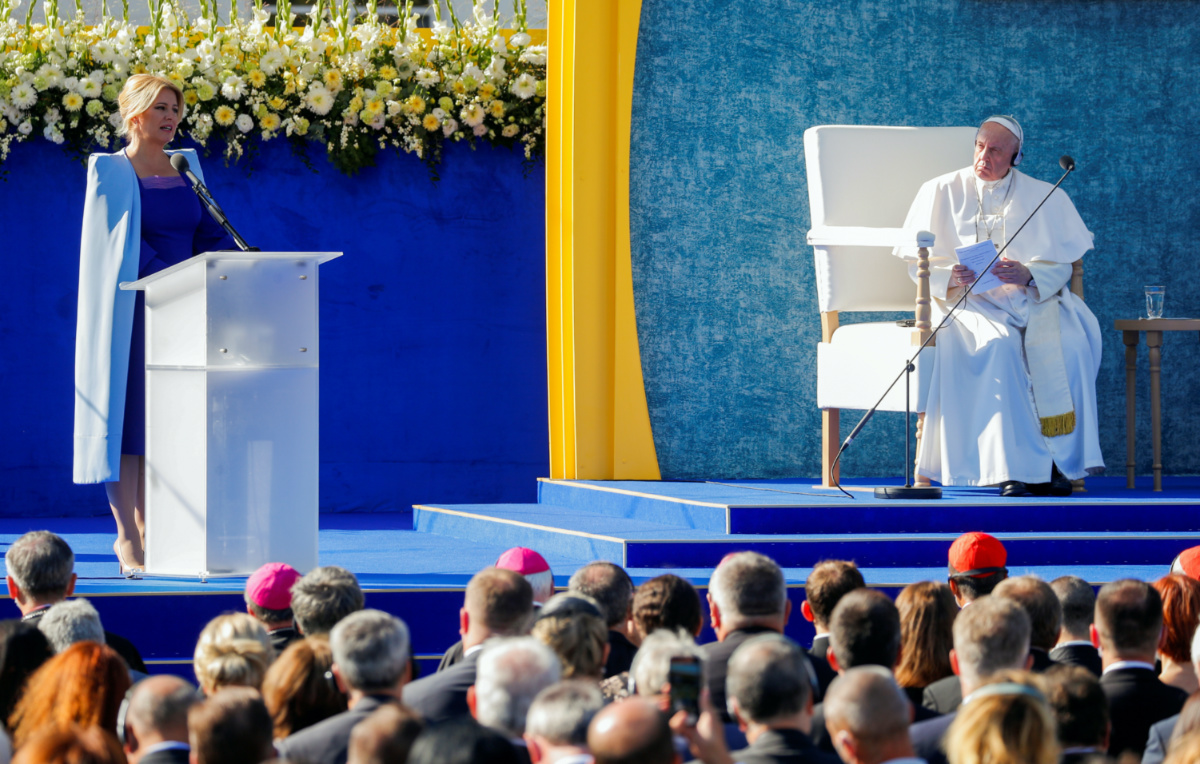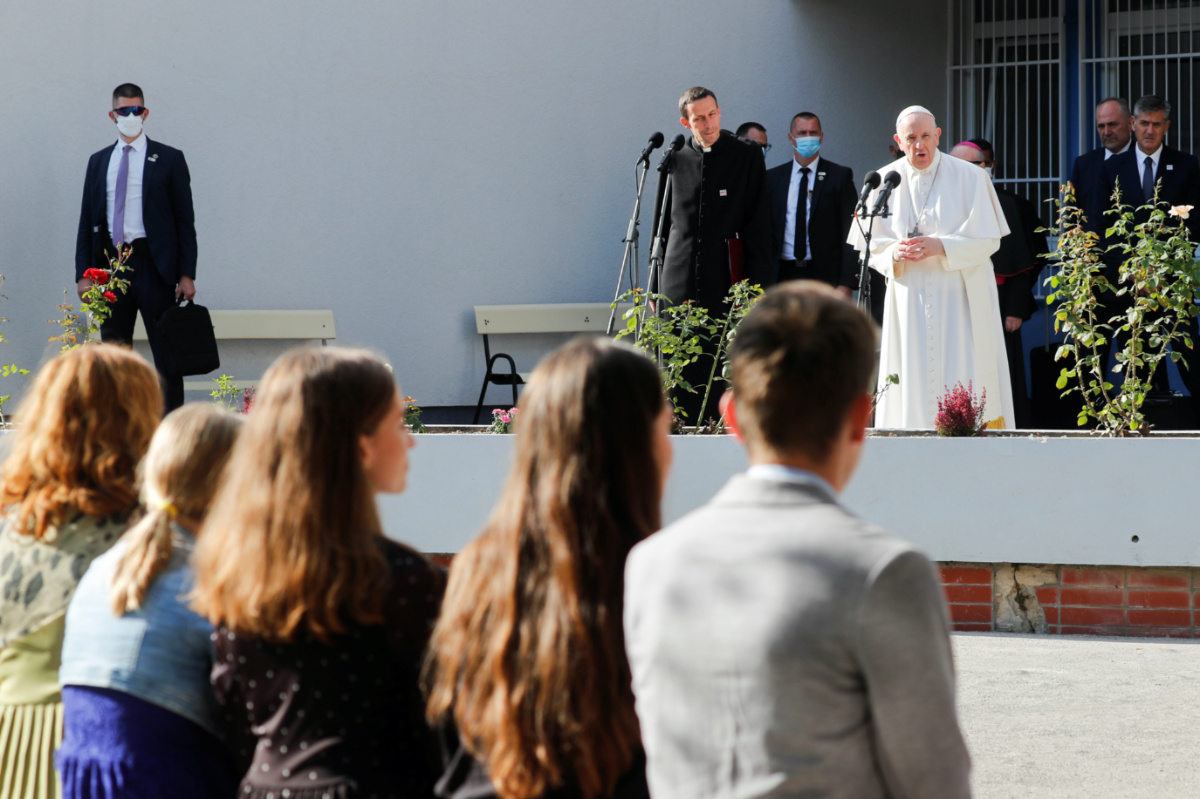Bratislava, Slovakia
Reuters
Pope Francis warned against too much focus on individual rights and culture wars at the expense of the common good on Monday during a visit to Slovakia amid increased nationalism and anti-immigrant sentiment across eastern Europe.
The 84-year-old Francis, looking fit, is making his first trip since undergoing intestinal surgery in July. Asked by a reporter on Monday how he felt, he joked: “Still alive.”

Slovakia’s President Zuzana Caputova gives a speech during a meeting with Pope Francis at the Presidential Palace in Bratislava, Slovakia, on 13th September. PICTURE: Reuters/Remo Casilli
On the first papal visit to Slovakia since 2003, Francis returned to a theme he had touched on during a stopover on Sunday in Hungary on how nations should avoid a selfish, defensive mentality as he recalled the region’s communist past.
“In these lands, until just a few decades ago, a single thought system [communism] stifled freedom. Today another single thought system is emptying freedom of meaning, reducing progress to profit and rights only to individual needs,” Francis said.
Addressing Slovak President Zuzana Caputova, other officials and diplomats in the gardens of the presidential palace, the Pope added: “Fraternity is necessary for the increasingly pressing process of [European] integration.”
Slovakia, part of Czechoslovakia during communist times, secured its independence from Prague in 1993. The Slovak and wider eastern European economies have since boomed but their integration into the European Union has also coincided with a nationalist backlash against increased illegal immigration, often involving Muslims from the Middle East and Afghanistan.
Eastern discontent
Slovakia’s neighbours, Hungary and Poland, have been at loggerheads with the EU over their hard-line stance on migration as well as over their judicial reforms and curbs on media freedoms.
In September, Brussels told Poland its challenge to the primacy of EU law over national law was holding up the release of €57 billion in recovery funds to deal with the effects of the COVID-19 pandemic.
Francis specifically mentioned the EU recovery plan on Monday, saying people were “looking forward with hope to an economic upturn” it is meant to underpin.
The Pope has often called for European solutions to the migrant crisis and has criticised governments that try, like Hungary’s, to tackle it with unilateral or isolationist actions.
In Budapest on Sunday, in an apparent response to nationalist Prime Minister Viktor Orban’s stand that Muslim immigration could destroy its heritage, he said preserving a nation’s deeply rooted Christian heritage did not exclude a welcoming, caring attitude for others in need.
“Our Christian way of looking at others refuses to see them as a burden or a problem, but rather as brothers and sisters to be helped and protected,” he said on Monday.
Slovakia is about 65 per cent Catholic.
At a meeting with bishops, priests and nuns, Francis said Catholics also must not be inward-looking, self-absorbed and defensive, in an apparent reference to his conservative critics who are resisting change.
“The church is not a fortress, a stronghold, a lofty castle, self-sufficient and looking out upon the world below,” he said.
The Pope later visited a memorial on the site of a synagogue demolished by the communists in 1969 and paid tribute to the more than 100,000 Slovak Jews killed in the Holocaust, saying it was shameful how people who said they believed in God perpetrated or permitted “unspeakable acts of inhumanity”.
At a sombre ceremony at a spot where a synagogue was demolished during the post-war communist era, ostensibly to make room for a bridge, the Pope said the real reason was because “they wanted to cancel every trace of the [Jewish] community.”

Pope Francis speaks during a visit to the Bethlehem Center in Bratislava, Slovakia, on 13th September. PICTURE: Reuters/Remo Casilli
“Here, in this place, the Name of God was dishonored, for the worst form of blasphemy is to exploit it for our own purposes, refusing to respect and love others,” the Pope told representatives of the Jewish communities of Slovakia.
“Here, reflecting on the history of the Jewish people marked by this tragic affront to the Most High, we admit with shame how often his ineffable Name has been used for unspeakable acts of inhumanity!” Francis said.
The open space, which is adjacent to a Catholic cathedral and other buildings what were spared, is now a memorial to the dead. The Jewish community in Slovakia now numbers about 2,600 people.
“How many oppressors have declared ‘God is with us’ but it was they who were not with God,” Francis said, before listening to testimonies by a survivor who lost his parents in the Holocaust and a nun who spoke of Catholics who risked their lives to save Jews.
At the end of the ceremony a cantor sang in Hebrew while standing near stones from the demolished temple.
Jozef Haľko, an assistant bishop of Bratislava, told reporters at the site that it was “paradoxical” that the communists decided to destroy the synagogue while letting other buildings there stand.
Last week, Slovakia marked the 80th anniversary of the Jewish Codex – a legal framework for the persecution of Jews. Slovak Prime Minister Eduard Heger apologised to the Jewish community on behalf of the country on the anniversary.
A survey by Globsec thinktank last year said 51 per cent of respondents said Jews held too much power globally and that they were controlling governments and other institutions.
During World War II, the Slovak State, a puppet regime established under the auspices of Nazi Germany in 1939 after the breakup of Czechoslovakia, had even pledged to pay the Nazis for each Jew transported out of the country.
The wartime President, Catholic priest Jozef Tiso, is still revered by some groups in Slovakia, including members of a far-right party whose logo and other symbols are inspired by those used then by Tiso. He was sentenced to death and executed for war crimes in 1947.






